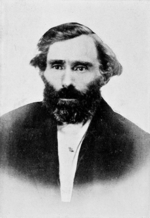Eugene Skinner facts for kids
Quick facts for kids
Eugene Skinner
|
|
|---|---|
 |
|
| Born |
Eugene Franklin Skinner
September 13, 1809 |
| Died | December 15, 1864 (aged 55) |
| Resting place | Masonic Cemetery in Eugene |
| Occupation | sheriff, ferry operator, farmer, lawyer |
| Known for | founder of the city of Eugene, Oregon (1851) |
| Spouse(s) | Mary Cook (m. 1839) |
| Children | 4 daughters: Mary, Leonora, Phoebe, and Amelia; 1 son: St John |
Eugene Franklin Skinner (September 13, 1809 – December 15, 1864) was an important early American settler. He is famous for founding the city of Eugene, Oregon, which is named after him.
Contents
The Life of Eugene Skinner
Early Life and Moving West
Eugene Skinner was born in Essex, New York. When he was 14, his family moved to Green County, Wisconsin. As an adult, Skinner lived in Plattsburgh, New York for a short time. He then settled in Hennepin, Illinois, where he became the county sheriff.
On November 28, 1839, Eugene married Mary Cook. In May 1845, he and Mary traveled overland to California. They spent the winter at Sutter's Fort.
Settling in Oregon
In 1846, the Skinners headed north to the Oregon Country. They joined a group exploring the Willamette Valley. Skinner chose land near the Willamette River. The local Kalapuya Indian tribe advised him to build his home on higher ground. This was because the area often flooded. Following their advice, he built his first cabin on a hill. This hill is now known as Skinner Butte.
Family Life and Work
The Skinners became farmers and raised five children. They had four daughters: Mary, Leonora, Phoebe, and Amelia. They also had one son, St John.
Eugene Skinner also ran a ferry service across the Willamette River. This ferry helped people and goods cross the river. After Oregon became a U.S. territory in 1849, Skinner also worked as the local postmaster.
Founding Eugene City
In 1851, Skinner and a local judge named David M. Risdon planned out a new town. They called it "Eugene City." This name was later shortened to "Eugene" in 1889. Skinner gave some of his own land for county buildings. He also started working as a lawyer. He served as a county clerk and a trustee for Eugene City.
Later Years
In 1861, there was a big flood. Eugene Skinner became ill after trying to save his cattle during this flood. He was not well for the last few years of his life. Eugene Skinner passed away in Eugene on December 15, 1864. He is buried in the Eugene Masonic Cemetery in Eugene.
 | Georgia Louise Harris Brown |
 | Julian Abele |
 | Norma Merrick Sklarek |
 | William Sidney Pittman |

